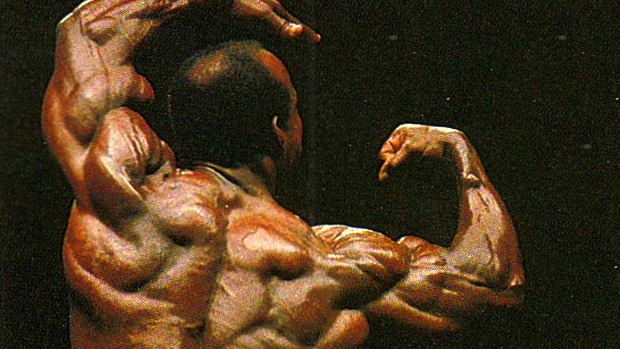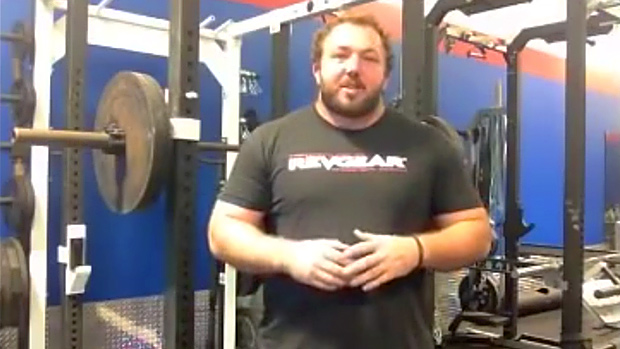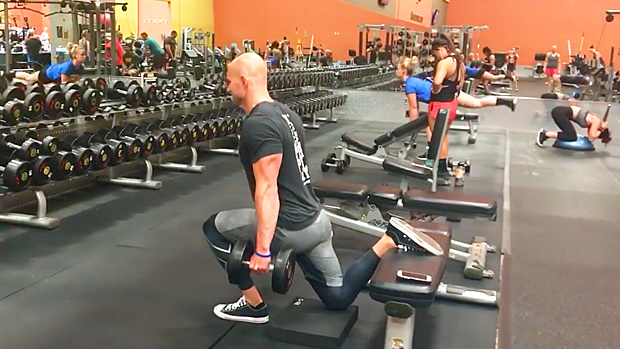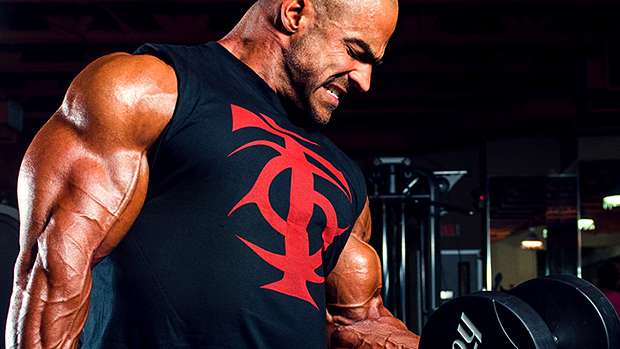I never believed the notion that natural athletes couldn't learn anything
from professional bodybuilders. Sure, juice is involved, and I did hear
from Congress that it tends to help people get bigger, stronger, and
leaner. But, that doesn't mean we need to toss everything out
with the needle and gauze.
 |
"Everyone's juicin'. It's all the rage."
You could say that steroids tainted two of history's most beloved pastimes:
baseball and weightlifting. Just like Barry Bonds' seven MVP's, Roger
Clemons' seven Cy Young awards, and Jose Canseco's 40/40 season, success
in bodybuilding leaves clues for anyone hungry enough to find them. These
are the lessons missed by the blind because they're too busy looking
for the syringe.
I mean, what do you do when your girlfriend tells you to do something?
Do you do the entire thing or do you pick the most important parts to
keep her happy? It's the same with training, you sly dog, you.
Understanding the Complexity of the Back
I'm an anatomy guy. I like knowing what the flexor hallucis longus does
because it breaks the ice at parties. So, I get a little excited about
the numerous muscles that make up the back. You have four traps, two
rhomboids, and a big erector spinae, amongst many smaller muscles.
Today, back training tends to get lumped into vertical and horizontal
pulling categories. It's a good beginning, but it doesn't apply all of
the time. I've read interviews where the best of the best, including
Jay Cutler and Franco Columbo, talked about how they believe you need
to do multiple exercises and use numerous angles when training the back.
 |
Mr. Olympia
I'm not advocating training every which way. But due to the intrinsic
nature of the back, we need to train through multiple ranges of motion.
I've come across research that describes the upper aspect of lats as
having slow-twitch properties, while the upper traps are more fast-twitch,
thus needing lower reps. Going as low as three reps and as high as fifteen
is never a bad idea.
It's here that typical training knowledge becomes confused with steroid
abusing training advice. To be practical and develop a topnotch back,
we're going to have to realize that the guy online with the freaky back
just might be doing some other stuff. Taking his blind advice
about always training with fifteen reps is as bad as listening to the
guy with the master's degree who says to ignore the bodybuilders. Take
the best pieces of both worlds and use them to dominate.
Improve Your Foundation
This goes along with my point above: We can't just follow the advice
of the biggest guy and train with every damn machine in the gym. Self-assessment
is hard. That's why most people don't do it. But, looking at yourself
in the mirror and taking pictures is the absolute best thing you can
do to assess your level of progress. Be painfully honest with yourself.
Pour some salt on those self-inflicted founds.
Pick any pro on stage and he'll tell you he built his back by having
a chin-up bar as a kid and just going to town. A chin-up bar doesn't
require a six-figure income, and there's certainly nothing fancy about
'em. But, if you haven't laid the basic foundation and can't do at least
twelve bodyweight chin-ups in a row, then you have no business doing
a high machine row.
 |
He's a Governor now.
I've read over and over again about how many coaches say that the chin-up
bar doesn't build big backs. And here's my beef. Their main issue is
that people use too many assistance muscles and not enough prime movers.
Yeah, I'll buy that. But, whom are we talking to here? I'm not saying
that if you're 17-years-old you need to be doing pull-ups and if you're
advanced you don't. Because I've seen many large fellas that have backs
like your best friend's kid sister.
While we're on the topic of chin-ups, I have another bone to pick. Why
do people think you can only do one form of chin-ups per four
weeks of training? If we acknowledge that multiple grips work to bring
up a weak muscle, and that chin-ups are the foundation of a bitchin'
back, then why aren't we using them more? Off the top of my head, I can
think of some very effective variations:
• Pull-ups (close, narrow, or wide grip)
• Neutral chin-ups (close, narrow, or wide
grip)
• Chin-ups (close, narrow, or wide grip)
• Hockey grip (thank you, Mike Boyle)
• Fat grip pull-ups (close, narrow, or wide
grip)
• Towel pull-ups
• Towel chin-ups
• Cable handle chin-ups
• Cable handle pull-ups
Don't be Afraid of a Supinated Grip
Dorian Yates, who in many eyes displayed the greatest back ever, was
a fan of supinated grip rowing. Many people will knock this method by
pointing out that Dorian's great career was ended due to his nagging
injuries, which came from his training style. But, his supinated grip
style of back training was the difference between that dense, thick,
rugged back and, well, everyone else.
 |
Dorian knows a thing or two about back training.
While a very simple technique, turning your palms up allows for more
total load to be used and provides a greater back contraction. Supination
puts our shoulders into external rotation. I'm not going to go the corrective
route here, but how effective is the back training of someone with a
Neanderthal posture going to be? Not very. Training with the palms up
will automatically help pull our scapula in the direction we want, thus
recruiting more muscles. Basic, I know, but brutally effective.
Still, this isn't something that I see enough people doing. Is it because
most people train their biceps on the same day that they train their
back? I don't really know. Personally, I leave 48 hours between my back
and arm training sessions, so that I don't experience the fatigue and
can train my back heavier.
If you've never done a machine pull-over with your palms up, then you
have no clue as to what sorts of lifting bliss you're missing. Both the
stretch and contraction of the lat at the beginning and end of the movement
are ridiculous.
Explosive Lifting
Another method left in the corner of badass bodybuilding gyms just might
be the best kept secret to increasing trap thickness and size. Think
back to anytime you've seen someone performing a power clean in the gym.
Typically, they've been football players that just happen to wander in
thinking there was free food. But Albert Beckles, whom many have said
had the most detailed back of all time, was notorious for doing multiple
sets of high-rep power cleans.
Now, I know that'll raise the eyebrow of my fellow T-Men, and I do advise
against high-rep power cleans from both an execution and muscle failure
perspective. There's just no way you can keep your form tight and speed
right if you do multiple reps. That being said, this whole article is
about taking certain techniques and placing them in your toolbox.
I bet every time you sit down and think about your training you never
consider adding power cleans. Chad Waterbury has written extensively
about the benefits of lifting fast for size, so I won't beat the horse.
But, I'll remind everyone that explosive lifting is the best thing you
can do for recruiting the fast-twitch muscle fibers, which have the most
potential for growth. The upper traps are a body part that I've found
to be primarily fast-twitch, thus thriving on heavy loads. Power cleans
are the best recipe for meaty traps.
Get a Deep Stretch
We've all witnessed that boy wonder on the seated cable machine leaning
so far forward that it looks like he's kissing the rack. Pretty funny,
huh? While this person may have no clue what they're doing, you should
pay attention.
This isn't backed by stacks of studies, but the lats grow better with
a deep stretch at the end of the movement. Perform a seated cable row
and round your shoulders (if you can pass a physical) at the end. Now
go ahead, try to tell me that you didn't feel a greater contraction in
your lats. A deeper stretch during most back movements would do people
some good.
 |
Gina's got the ill back.
Blood Volume Training
The great Sergio Oliva was a huge fan of supersetting a vertical pulling
movement, like a pull-down, with a horizontal pull, like a bent-over
barbell row. While this will certainly make you feel instantly bigger
due to the "pump," there might be some truth to long-term growth associated
with blood volume training.
Muscle is only about 30% protein. The rest is comprised of water, blood,
mitochondrial density, and other factors. Keep in mind that blood also
carries hormones, so why not attempt to force it into the muscle at a
supercharged rate? This isn't to say that all pump training will
result in growth, but it's worth a try.
Milos Sarcev, love him or hate him, often has his precontest bodybuilders
perform multiple exercises, sometimes four or five in a row, before they
rest. If the estimated 70 to 80% of blood flows to a contracting muscle,
then why wouldn't we want to get the most out of it?
Now, of course there has to be a nutrition side to this. You can't just
pump up a muscle, cross your fingers, and hope it'll grow. This is why
I recommend taking Surge during your workout.
Chris Shugart spoke all about the advantages of using Surge in his Double
Surge Challenge article. What he didn't mention was the impressive
glycogen replenishment that comes from using Surge. If I'm drinking Surge
and poppin' some additional branched chain amino acids (BCAA's),
then I'm going to quickly deliver those nutrients to the working muscle.
What's the whole point of post-workout nutrition, anyway? To get the
nutrients to your muscles as fast as possible! And when is our blood
flow, which pushes nutrients into the muscle, at its greatest? Post-workout,
for sure, but also intra-workout! Supersetting back exercises
and forcing nutrients into those same muscles will do nothing but increase
our size gains.
Class Dismissed
I treat physique transformation like any other field: Pick the best
parts and ignore the rest. Just because Larry Bird had a God-awful looking
jump shot, it doesn't mean we can't pick up a few shooting tips. Take
these proven tips and apply them today to get jacked, baby!





